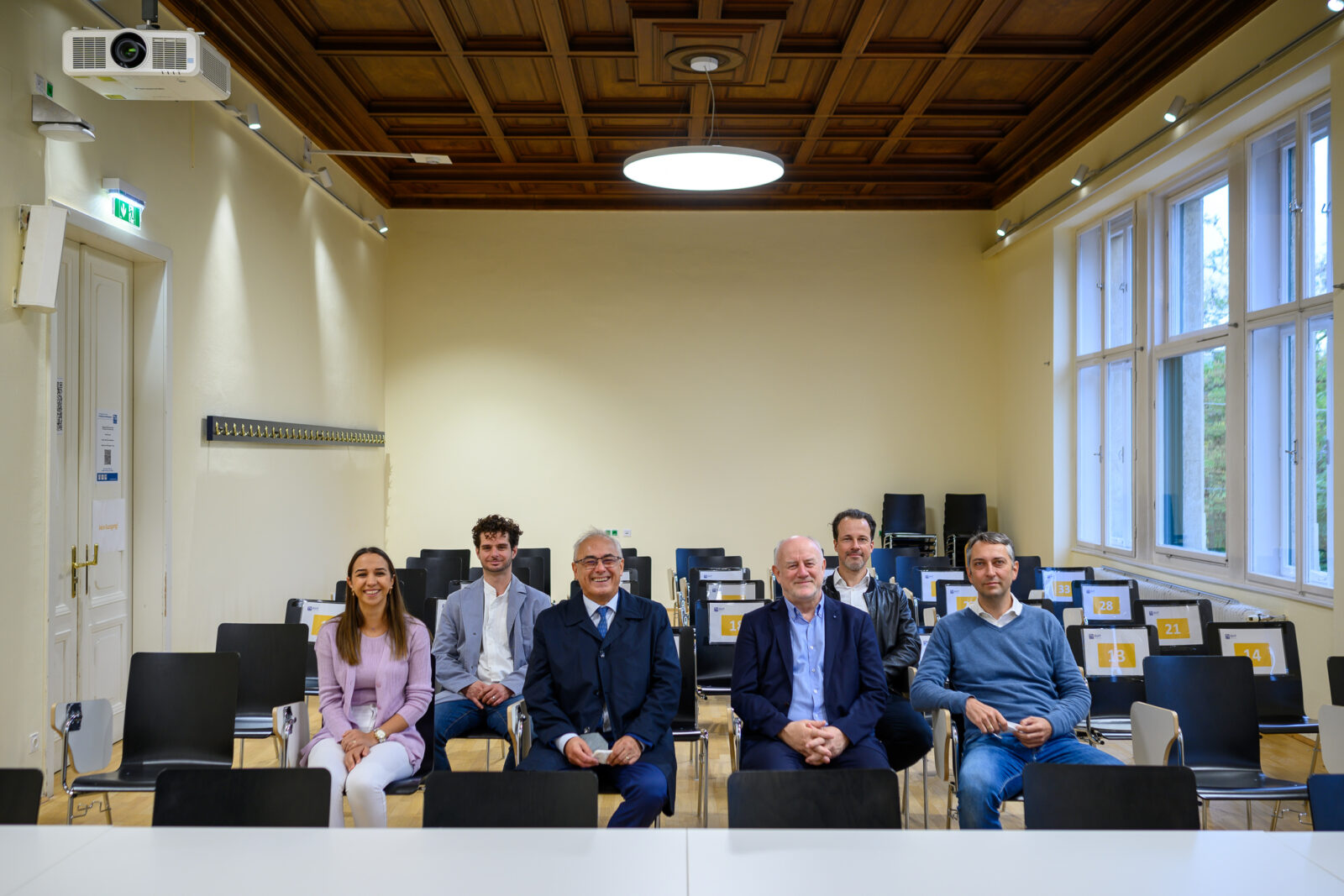Further expansion of the library’s bibliometric services
With the expansion of the bibliometric services, the library supports faculties, institutes as well as individual scientists: The scientometrics and data visualization group prepares reports on the research and publication activities of applicants in the context of appointment procedures. It provides scientometric analyses to institutes for the establishment of international cooperations and strategic partnerships. Individual scientists benefit from training and advice on publication strategies (e.g. publication media, increasing visibility, author profiles). The monitoring of metadata in research databases and possible corrections help the TU Wien to achieve better ranking results. For the expansion of data visualizations, a data visualization engineer will be hired as of July 2021.
Content- and process-based collaboration
TU coLAB primarily supports a “content-centric” collaboration approach. After one year of operation, the need to support collaboration along processes (“workflows”) also becomes apparent. Therefore, Confluence’s sister product, Atlassian Jira, was installed and is available to complement coLAB for task and project management. Currently, Jira is already used for several digitization projects (ADLS, JaaS) as a tool for software project management. Within TU.it, a proof of concept (PoC) for Jira as a tool for project control and project portfolio management is currently taking place….
Digitization of the tendering process for scientific personnel
After the successful digital transformation of the job posting process for the general staff of the TU Wien, now also for the scientific staff the digital process has been implemented. After a transition period, the following types of employment relationships in the global budget (permanent staff & special funding) will be handled digitally as of 01.05.2021:
-Assistant Pre-Doc,-Assistant_in Post-Doc,Senior Scientist,Senior Lecturer,career positions,Student employees in research and administration,Apprentices (here, in the course of the scientific staff, the digital tender workflow for apprentices has now also been made possible).
The process then looks as follows: The approval process is triggered in Insight by the dean’s offices or vice rectorates via the planned personnel number. All necessary approvals (heads, AKG, department SAP planning, …) are obtained digitally in TISS. The advertisement is then automatically sent to the eRecruiter via an interface and published. Applications are sent out via the eRecruiter customer portal (for authorized persons) (except for career positions/professorships, which are automatically transferred to TISS via an interface). This starts the application process.
Freihaus und Bibliothek
Hauptbibliothek der TU Wien
Content- and process-based collaboration
TU coLAB primarily supports a “content-centred” collaboration approach. After one year of operation, the need to support collaboration along processes (“workflows”) has also become apparent. Therefore, the sister product of Confluence, Atlassian Jira, was installed and is available as a supplement to coLAB for task and project management. Currently, Jira is already being used for several digitisation projects (ADLS, JaaS) as a tool for software project management. Within TU.it, a proof of concept (PoC) for Jira as a tool for project control and project portfolio management is currently being carried out.
Digitisation of the tendering process for academic staff
Following the successful digital transformation of the job advertisement process for general staff at TU Wien, the digital process has now also been switched to for scientific staff. After a transition period, the following types of employment relationships in the global budget (permanent staff & special funding) will be handled digitally from 01.05.2021:
- Assistant Pre-Doc,
- Assistant post-doc,
- Senior Scientist,
- Senior Lecturer,
- career positions,
- Student employees in research and administration,
- Apprentices (here, in the course of the scientific staff, the digital tender workflow for apprentices has now also been made possible).
The process then looks as follows: The approval process is triggered in Insight by the deaneries or vice rectorates via the planned staff number. All necessary approvals (heads, AKG, department SAP Planning, …) are obtained digitally in TISS. The advertisement is then automatically sent to the eRecruiter via an interface and published. Applications are sent out via the eRecruiter customer portal (for authorised persons) (with the exception of career positions/professorships, which are automatically transferred to TISS via an interface). This starts the application process.
TUworkPlace
The goal of the TUworkPlace project is to provide the operating infrastructure with Virtual Desktop Infrastructure (VDI) technology. Static desktops are transformed into secure, digital workplaces using VDI technology. Employees, whether at TU Wien or mobile, will have a simpler, secure, and personalized application experience across all devices, locations, media, and connections. In Q2, customer requirements were gathered, and a standard desktop was defined and deployed. This allowed 45 “friendly users” to enter an extended test phase in June with easy access without a VPN. This test phase is expected to last until the end of August 2021. Once the productive environment has been expanded and completed, it will be rolled out to a larger group of employees by the end of this year.
Storage Next Generation
The goal is to provide a storage system at the data center sites that meets all capacity and performance requirements while being scalable and easy to maintain. In Q2/2021, the provision of the rack infrastructure for the storage project was successfully completed. The necessary modification work on the rack infrastructure and associated work to relocate numerous systems has been carried out. The new storage switches in the primary Freihaus data center were prepared for operation and the necessary cabling was installed in the network cabinets. The existing Heartbeat network was restructured accordingly so that the necessary rack conversions could also be completed in the Gußhausstraße backup data center. The management software required for successful operation was procured.”
Video conferencing tools and data protection
The three video conferencing tools predominantly in use, Zoom, GoToMeeting and MS Teams, were assessed in terms of data protection and corresponding expert opinions were obtained. In accordance with the results of these expert opinions, the licenses for GoToMeeting were no longer renewed. Thus, with Zoom and MS Teams, two DSGVO-compliant video conferencing platforms are now in use at the TU Wien.
TISS G-Proof
With the TISS 3-G proof, a simple and quick access to the TUW buildings is possible since 13.09.2021. For this purpose, the “Green Passport” is uploaded to TISS, which enables a quick 3-G check and authentication of persons by the security service with the presentation of a TISS access screen on the smartphone.
Electrical renovation at the Institute of Management Sciences.
Since the beginning of summer 2021, work has been underway to renovate the electrotechnical infrastructure at Theresianumgasse 27. The goal is to ensure a safe and standard-compliant power supply. For this purpose, a new low-voltage main distribution room was built in the basement. The corridor areas, as well as the lecture halls, seminar and meeting rooms, were equipped with modern and energy-saving lighting. In addition, the WLAN network was expanded throughout the building and selective fire protection improvements were made.
Accessible documents and official signature
At TU Wien, numerous steps have already been taken to provide equal access to studies for all students and to reduce the administrative burden of studying. In 2021, the foundation was laid for two significant improvements in the area of accessibility and administrability of digital documents. Report cards, which can be generated automatically in TISS “Student Self Service”, are thus created as easily readable PDF files. In addition, the certificates have been redesigned to be barrier-free. The service will be available from January 2022 and will be extended to other automatically generated PDF files. In addition, an official signature service was introduced for study-related documents. Notices from the Department of Studies and documents from the TU Academy for Continuing Education are provided with the electronic official signature and can thus be clearly assigned to the TU Wien. Furthermore, these documents are better protected against forgery.
EOSC process picks up speed
The Austrian EOSC (European Open Science Cloud) Mandated Organisation was set up under the leadership of the TU Wien Library. The first milestone was reached with the organisation of the first General Assembly on 13.10.2021 at the BMBWF. For the next two years, the TU Wien Library will chair the General Assembly and coordinate the monitoring of the Austrian initiative. Together with the Natural History Museum, it also chairs the Key Performance Indicators working group and participates in the Austria Country Profile and Researcher Engagement working groups. Beate Guba and Paolo Budroni act as EOSC Reference Points at TU Wien, the latter is also responsible for setting up the EOSC Support Office Austria based at TU Wien and is the delegate of the Austrian initiative in the EOSC Association in Brussels. At the international level, the TU Wien Library participates in two task forces of the EOSC Association – namely the Task Force PID Policy and Implementation and the Task Force FAIR Metrics and Data Quality.



